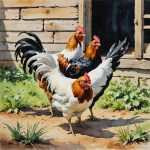In the quiet of a moonlit night, the soft rustling of feathers and the gentle clucking of chickens can be abruptly interrupted by the eerie howl of a coyote. These elusive creatures have long been a threat to backyard chicken keepers, presenting a constant concern for the safety of their flock. But fear not, for there are various measures that can be taken to deter these cunning predators and keep yoru feathered friends safe. Let’s uncover the secrets of what keeps coyotes away from chickens.
Table of Contents
Creating Physical Barriers to Protect Your Chickens
One effective way to keep coyotes away from your precious chickens is by creating physical barriers around their coop and run. These barriers can definitely help prevent predators from gaining access to your flock and reduce the chances of an attack. Some key methods for creating physical barriers include:
- Fencing: Install a tall fence around the coop and run area to keep coyotes out. Make sure the fence is buried underground to prevent predators from digging underneath.
- Hardware Cloth: Cover windows, vents, and other openings with hardware cloth to prevent coyotes from squeezing through and reaching your chickens.
- Electric Fence: Consider installing an electric fence around the perimeter of the coop for added protection. This can help deter coyotes from attempting to breach the boundary.
By implementing these physical barriers, you can help create a safe and secure habitat for your chickens, shielding them from potential threats like coyotes. Remember to regularly inspect and maintain the barriers to ensure their effectiveness in keeping predators at bay.
Utilizing Predator Deterrents to Keep Coyotes at Bay
One effective way to protect your chickens from coyotes is by utilizing predator deterrents. By employing a combination of tactics,you can create a fortified defense against these cunning creatures. One method is to install motion-activated lights around your coop and run area. the sudden burst of light can startle coyotes and deter them from approaching your flock.
Another strategy is to use sound deterrents,such as ultrasonic devices that emit high-frequency sounds that are unpleasant to coyotes. Additionally, employing guardian animals, such as dogs or llamas, can help keep coyotes at bay. These animals can act as a protective barrier and ward off potential threats to your chickens.By implementing these predator deterrents, you can help ensure the safety and well-being of your flock.
Implementing Sound and Lighting Devices as Coyote Repellents
In order to effectively keep coyotes away from chickens, it is crucial to implement sound and lighting devices as repellents. Coyotes are known to be deterred by loud noises and radiant lights, making these devices an effective solution to protect your flock.
One option is to install motion-activated sound devices that emit high-frequency noises that are irritating to coyotes, causing them to stay away from the area. Additionally, utilizing bright LED lights around the chicken coop can help deter coyotes, as they are typically more active during the night and are sensitive to sudden bursts of light.
Q&A
Q: What are some effective methods for keeping coyotes away from chickens?
A: There are several strategies that can help deter coyotes from preying on your chickens.
Q: What is the best way to secure a chicken coop to keep out coyotes?
A: Ensuring that the coop is securely fenced with heavy-duty wire mesh and a roof is one of the most effective ways to keep coyotes out.
Q: Are there any natural deterrents that can help keep coyotes away from chickens?
A: Some people have had success using items like predator urine, motion-activated lights, or loud noises to deter coyotes from approaching their chickens.
Q: How important is it to keep the area around the chicken coop clean and free of attractants?
A: keeping the area around the coop free of food scraps, garbage, and other attractants can help reduce the likelihood of attracting coyotes to your property.
Q: Are there any specific breeds of chickens that are more resilient to coyote attacks?
A: While no breed of chicken is completely immune to coyote attacks, larger breeds or those with more aggressive personalities might potentially be less likely to fall victim to predators.
In Conclusion
ensuring the safety of your precious chickens from opportunistic coyotes is vital for maintaining a peaceful coexistence between wildlife and poultry.By utilizing a combination of strategies such as secure fencing, deterrents, and vigilant supervision, you can effectively ward off these wily predators and protect your feathered friends. Remember, a little creativity and proactive measures can go a long way in keeping your chickens safe and sound.So, keep those coyotes at bay and enjoy the serenity of your backyard oasis. Happy farming!
Meet Walter, the feathered-friend fanatic of Florida! Nestled in the sunshine state, Walter struts through life with his feathered companions, clucking his way to happiness. With a coop that’s fancier than a five-star hotel, he’s the Don Juan of the chicken world. When he’s not teaching his hens to do the cha-cha, you’ll find him in a heated debate with his prized rooster, Sir Clucks-a-Lot. Walter’s poultry passion is no yolk; he’s the sunny-side-up guy you never knew you needed in your flock of friends!






